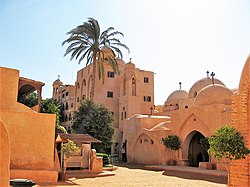Wadi El Natrun is a valley in Lower Egypt. The valley contains several alkaline lakes, salt deposits, salt marshes and freshwater marshes. The area home to four historic Coptic monasteries still in use.
Understand
[edit]Wadi El Natrun is an area of low elevation northwest of Cairo. It's characterized by the presence of salt pans, marshes and "natron", a naturally occurring mixture of sodium carbonate decahydrate (Na2CO3·10H2O, a kind of soda ash) and around 17% sodium bicarbonate (also called baking soda, NaHCO3) along with small quantities of sodium chloride and sodium sulfate. It's a key ingredient to the mummification process, as a desiccant of deceased flesh. Natron was harvested here by the Ancient Egyptians, Coptics, and Romans, not to mention modern day Egyptians. For a period, there was also a tourist train to the low-lying lakes.
What is possibly most significant about the area though is the presence of four historic Coptic monasteries still in use. These are the Monastery of Saint Macarius the Great, Paromeos Monastery, the Monastery of Saint Pishoy, and Syrian Monastery, collectively known as the monastic center of Scetis. From here, the Desert Fathers, with their asceticism, were very noteworthy in developing early Christianity from about 200-400 AD.
Another interesting point about the area is that it is believed to be the crash site of Antoine de Saint-Exupéry in 1935, who, after managing to miraculously survive this and then almost dying later of thirst while trying to escape the desert, devised his story for The Little Prince.
Get in
[edit]This should be an easy drive from Cairo or Alexandria, being about halfway between the two on highway 75.
Get around
[edit]See
[edit]



When visiting the following monasteries, it is good to take a tour from a monk, to get a better picture of the background of these ancient places. Admission to the monasteries is free, but donations are accepted.
- 1 Monastery of Saint Macarius the Great, ☏ +20 48 2600471. Built around 360 AD, it was the monastic home to such saints as Saint Macarius of Alexandria, Saint John the Dwarf, and Saint Paphnutius the Ascetic. It is claimed that the crypts of Saint John the Baptist and Elisha the Prophet were discovered under the northern wall of the church during a restoration.
- 2 Paromeos Monastery, Al Deblomasein Rd, ☏ +20 122 737 7904. Built in 335 AD by Saint Macarius the Great, it was also the home of Saint Arsenius, Saint Isidore, and Saint Moses the Black. The name Pa-Romeos (that of the Romans) originated from Romans and Roman saints who came to stay there. Five churches are on site, with the oldest dedicated to the VIrgin Mary, and 2.5 km to the northwest is the cave of Pope Cyril VI with relics and icons.
- 3 Monastery of Saint Pishoy, ☏ +20 3 5460511. Built in the 4th century and perhaps the most visited of the four monasteries. Among the saints resting here are Saint Pishoy, Saint Paul of Tammah, and Pope Shenouda the third. The body of the first is said to be incorrupt. Here also is the Well of the Martyrs where Berber Muslims supposedly cleaned their swords after slaughtering 49 Christians as well as a keep to ward off Berber attacks at that time.
- 4 Syrian Monastery, ☏ +20 2 25905161. Also known as Monastery of Saint Mary El-Souria (Dayr al-Suryān) because of its frequent use by Syrian monks from the 8th-14th centuries, was established in the 6th century and likewise went through a series of Bedouin and Berber attacks as well as an instance of plague. Inside is a notable feature called the Door or Gate of Prophecies depicting past and future visions of the Christian faith that the monks had during the 10th century. Frescoes adorn the walls of the church and chapel, and a number of discovered scripts were taken to the British Museum. Just to the west of the monastery is the His Holiness Pope Shenouda III Shrine.
Do
[edit]Buy
[edit]Eat
[edit]Drink
[edit]Sleep
[edit]- 1 Green Desert Hotel (جرين ديزرت), Alexandria Desert Rd, Beni Salama, Al Natron Valley, ☏ +20 120 057 7280. Has two big pools, and, since it's out in the desert, that's nice. Restaurant with breakfast buffet. A/C, wifi, gym, airport shuttle. LE696.
